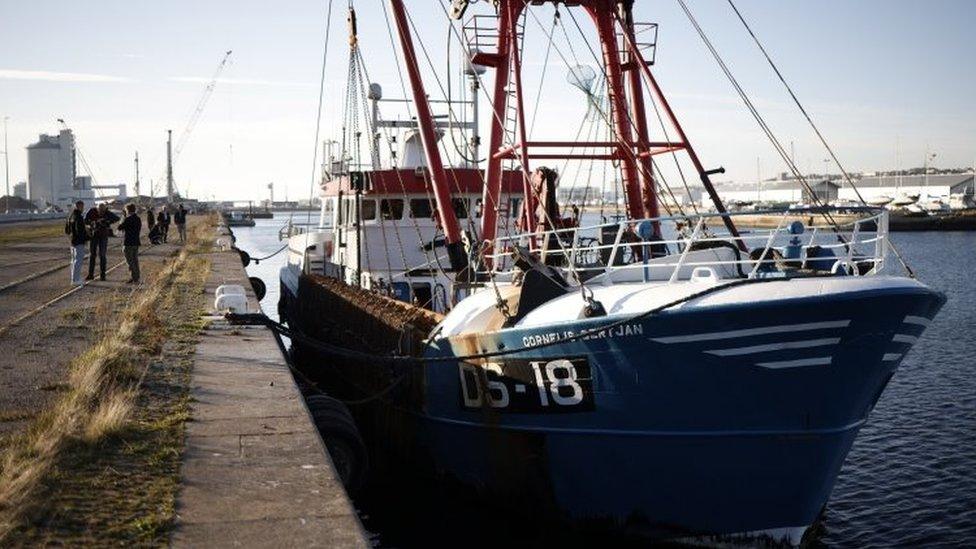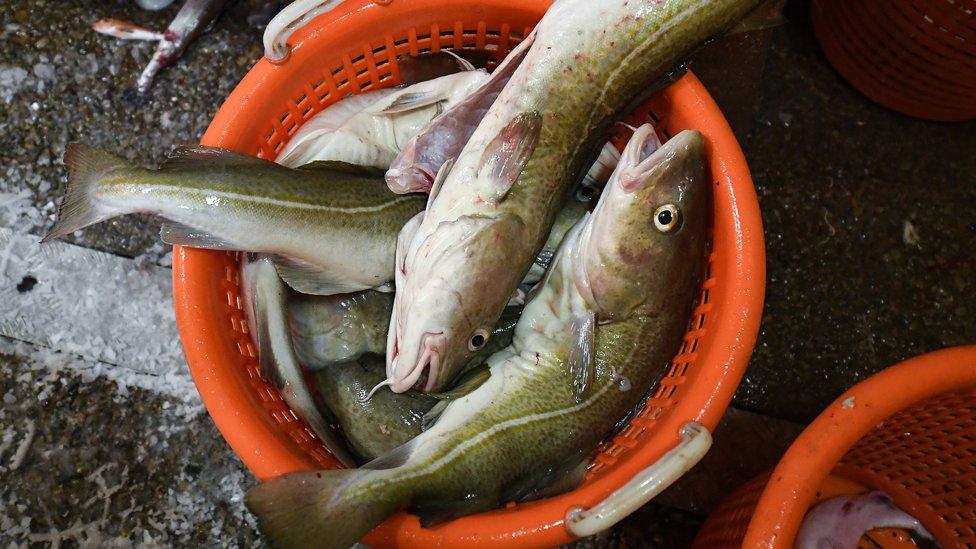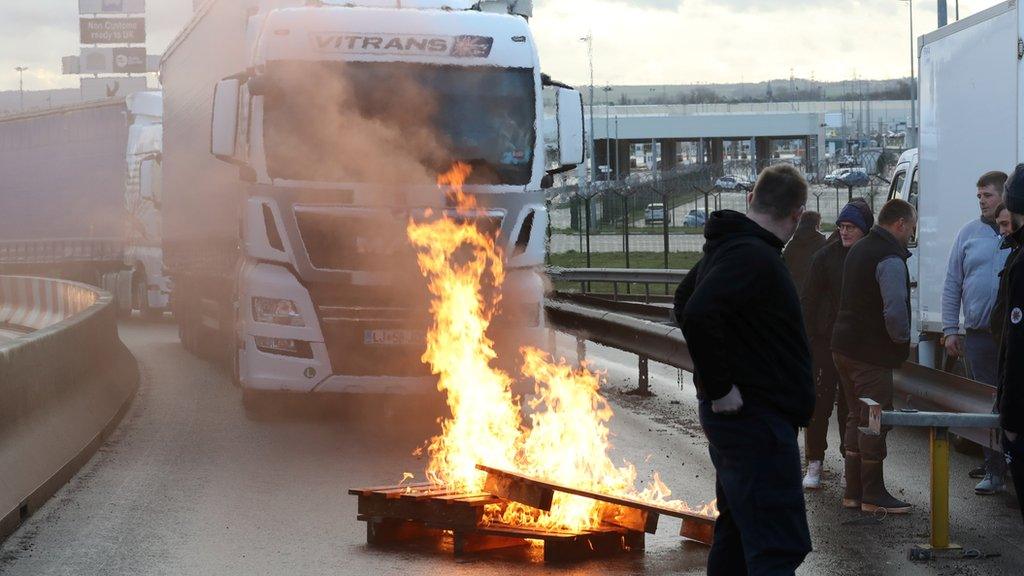Fishing row: PM fears breach of EU-UK trade agreement
- Published

Boris Johnson says he fears the EU-UK trade agreement may have been breached in a dispute with France over post-Brexit fishing rights.
It comes after France said it could stop UK boats landing in its ports if the row over licences was not resolved.
The prime minister said the UK government would do "whatever is necessary to ensure UK interests".
The French president said the fishing row and disputes over Northern Ireland were a test of the UK's credibility.
The argument - essentially over how many French fishing boats are allowed to fish in UK waters - began when the UK and Jersey denied fishing licences to dozens of French boats last month.
'Lawful business'
Mr Johnson said: "British fishermen should be confident in going about their lawful business and they should be encouraged to continue fishing in accordance with the [EU-UK trade] agreement.
"France is one of our oldest, closest allies and friends. The ties that bind us together are far stronger than the turbulence that currently exists in the relationship."
French President Emmanuel Macron told the Financial Times, external: "Make no mistake, it is not just for the Europeans but all of their partners. Because when you spend years negotiating a treaty and then a few months later you do the opposite of what was decided on the aspects that suit you the least, it is not a big sign of your credibility."
The leaders' comments come ahead of a "brush by" meeting they are expected to have at the G20 summit in Rome this weekend.
Meanwhile, the BBC's political editor Laura Kuenssberg says she has seen a letter which appears to show the French prime minister Jean Castex appealing to the EU to demonstrate there is "more damage to leaving the EU than to remaining there".
France was angered by a decision from the UK and Jersey last month to deny fishing licences to French boats, arguing it a breach of the Brexit deal.
The country then warned it would block British boats from landing their catches in some French ports next week and tighten checks on UK boats and trucks if the dispute was not resolved by Tuesday.
On Friday morning, Environment Secretary George Eustice said if necessary the UK would respond in turn, saying "two can play at that game".
The government also said it was considering launching "dispute settlement proceedings" with the EU if France goes ahead with the "unjustified measures".
Earlier, French ambassador Catherine Colonna was summoned to a meeting with foreign office minister Wendy Morton.
At the meeting - which lasted around 15 minutes - Ms Morton "expressed disappointment over the confrontational language that has been consistently used by the French government, which makes this situation no easier to resolve."


The French people are deeply attached to their fishing industry, suspicious of the British government, and share the general confusion about why some French boats are being given licences and others refused.
They take at face value their own government's claim that it is all grossly unfair, and that the planned retaliation against the UK is simply a defence of the national interest.
Which is not to say there aren't also worried voices urging caution.
The big fish and seafood traders based in Boulogne-sur-Mer depend heavily on British produce either unloaded at the quayside or brought in by lorry.
If those imports dry up, hundreds of jobs could be at stake - not to mention the valuable Christmas market for coquille saint-jacques and other shellfish.
It's commonplace in the UK to hear that by acting tough President Macron is merely playing to the gallery with an eye on next April's presidential elections.
And it's commonplace in France to hear that Boris Johnson is merely playing to his political gallery by baiting the oh-so-baitable French.
Suffice to say that right now neither side seems particularly inclined to do the other any favours.

Fishing was one of the final sticking points in the post-Brexit trade agreement.
As part of the agreement, licences would be given to vessels that could show they had fished in each other's waters for years. But there have been disputes about how much evidence is needed.
The UK says this was the case for the rejected applications which sparked the latest row.
The UK has also been seeking to change the Brexit deal for Northern Ireland - known as the protocol - because it says it is affecting trade, businesses and has led to a "brewing political crisis".
Tensions rose after a British trawler was seized by France and another fined during checks off Le Havre on Thursday.
French authorities say the Cornelis Gert Jan vessel did not have a licence - something the boat's owners deny. The captain of the scallop dredger faces a court hearing in August next year.
The UK environment secretary said the trawler had been granted a licence earlier this year and the government was "trying to get to the bottom" of why it had subsequently been taken off the list given to the EU.
Andrew Brown, from the boat's owners Macduff Shellfish, said: "We don't know where the error of interpretation of the licence lies... but I would believe that under normal circumstances a misunderstanding like this could be sorted out with a phone call."


YOU CAN HOP, BUT YOU CAN'T HIDE!: Join us for a classic Halloween film
THE OUTLAWS: Stephen Merchant's brand new comedy-drama

Related topics
- Published1 January 2021

- Published23 December 2021
